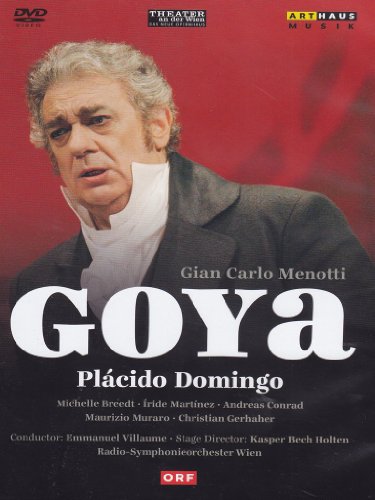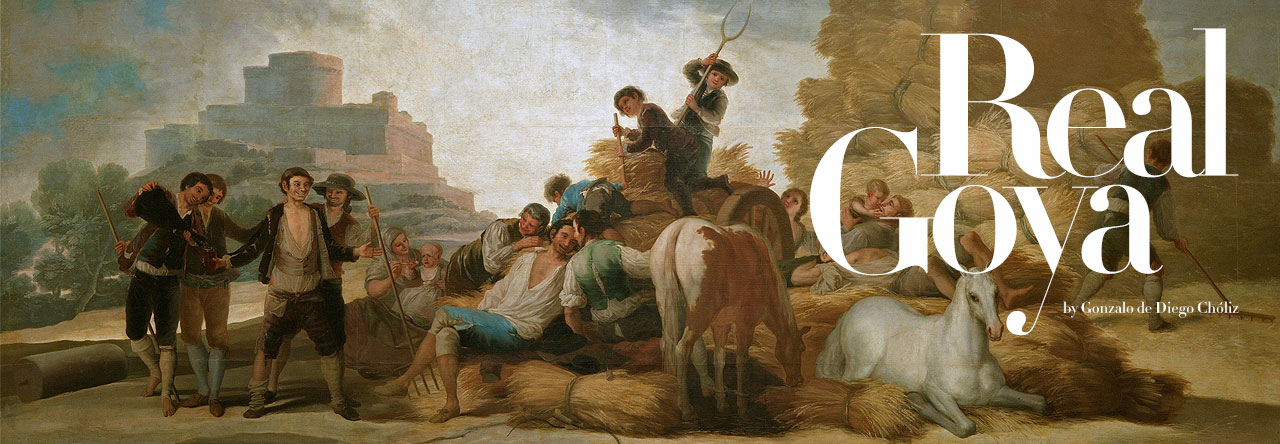In our section Goya and Literature we introduce a comment on a piece of music, specifically the Opera GOYA by G. C. Menotti. From the literary point of view the work does not have the height that is expected given that the figure of Goya predisposes to a complex creation, tense and dramatic, which does not remove value to music creation.

Opera: GOYA
Opera in three acts.
Libretto: Gian Carlo MENOTTI (1911-2007)
Premiere: Washington National Opera, 1986.
Cast:
Francisco de Goya y Lucientes…………………………….. Plácido Domingo
Doña Cayetana, Duchess de Alba……………………… Michelle Breedt
María Luisa, Queen of Spain……………………………….. Iride Martínez
Carlos IV, King of Spain……………………………………….. Andreas Conrad
Don Manuel Godoy…………………………………………….. Maurizio Muraro
Martín Zapater…………………………………………………… Christian Gerhaher
Leocadia…………………………………………………………….. Nadia Krasteva
Maid..…………………………………………………………………. Petra Simkova
Butler………………………………………………………………… Sergio Raonic Lukovic
DIRECTOR: Emmanuel Villaume
Staging: Kasper Bech Holte.
Vienna Radio Symphonic Orchestra.
Gian Carlo Menotti was not a revolutionary musician, but throughout his musical life explored different directions. He was the first to compose a radio opera and also one for television.
Music by Menotti liked a lot to Plácido Domingo: …”he writes his music in a very melodic way, that is the only way that a singer – and always gives great pleasure to the public”.
In 1977, Menotti invited Domingo to dinner, who then produced Carmen at the Edinburgh Festival. Domingo suggested to the composer to write an Opera for him, the life of a great Spanish artist and proposed Francisco de Goya to whom Domingo admires. Menotti accepted and began to carry out the first sketches. In November 1986 the work was staged at the Washington National Opera, under the direction of Rafael Frühbeck de Burgos.
Plácido Domingo played Goya and Victoria Vergara the Duchess of Alba.
Critics were not very favourable as the work was judged lacking of modernity, too melodic, in the Italian tradition of bel canto. It was clear that it was a work made for and by a tenor.
For Menotti, Goya symbolized freedom and the limits of the artist at the same time.
The work is founded on dualism between man and painter, modern, passionate, contradictory, on the one hand very ambitious and very wise politically on the other. Menotti focused the intrigue about the Duchess of Alba, the only great love of Goya and with a spirit opposite to the painter, thus creating a great dramatic tension.
The opera takes place in the last years of the life of the painter. Kasper Bech Holten puts at the centre of its staging the question: “Menotti’s Opera transforms Goya’s life into a reflection on the role of the artist itself and on the price you must pay for being a great artist”.
But it is also necessary to mention here that Menotti was not faithful to the historical facts, particularly in what concerns the loving relationship between the painter and the Duchess, but it is “a good story”.
Synopsis:
First Act: Goya, old and deaf, is overwhelmed by doubt and guilt feelings.
In a tavern, he falls in love for a young pride. Soon he knows that this young woman is the Duchess of Alba, one of the most influential women of Spain. She commissioned a portrait; during work, Goya experience increasingly intense feelings towards her.
Second Act: The Queen is jealous of the Duchess of Alba because of Goya. The Duchess raises her on the occasion of a dance where her chambermaids are dressed with the same model as the Sovereign. The Prime Minister Godoy, lover of the Queen, constrains Goya to an absolute fidelity to the Court. The Duchess feeling betrayed by the painter, whom she judges with weak character, breaks her relationship with him.
Third Act: Goya understands, too late, that has been manipulated by the fights of power between the Queen and the Duchess. He withdraws from social life to devote himself only to his art. The Duchess is poisoned by the Queen and in her agony she asks to see Goya, but the painter arrives too late. Goya is sick and in his solitude acknowledges that he has made the mistake of not having fought against injustices, and takes refuge in the creation. Before his death the Duchess of Alba appears to him, who tells him that his life and his art have been, despite everything, in the service of a transcendental ideal.
Indeed, the libretto of Menotti does not conform to the historical reality but meet a romantic argument, perhaps a little out of fashion. Anyway, we urge the readers of this article, based on the programme of the Opera, to listen to the great Plácido Domingo in the role of Don Francisco de Goya.
Silvia Pagliano
